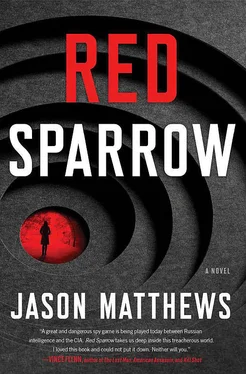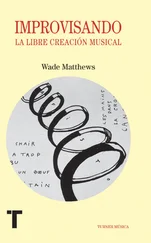“That’s good, Anatoly, because today we were briefed that Pathfinder is close to completing the first stage of bench testing for some of the navigational and targeting circuits. I’ve insisted on regular progress reports. I’m visiting Pathfinder in Los Angeles once a quarter. This project will be funded for another decade.” Boucher blew a stream of smoke straight up. “So, if your comrades in Moscow ”—this last said altogether too loudly, thought Golov, like a threat—“don’t want to pay, then okay, we’re finished and I’m done.”
Golov noted once again that it was a measure of Boucher’s sublime arrogance, of living in a world devoid of consequences, that she was incapable of contemplating the certainty that the Center would never let her “quit,” that the choice was not hers. Golov tried to imagine the meeting at which Boucher would be told that she would be required to continue spying for Moscow or be exposed.
“Of course we’re going to continue our collaboration,” said Golov soothingly. “Don’t even suggest anything else. We will continue safely and securely, you will continue to amaze and astound our people, we will continue to remunerate you for your efforts, and your career will flourish.” Golov had long since discarded the temptation to add ideological blandishments. A simple recitation of the facts sufficed. You pass us secrets, we pay you for them.
“I want to continue our discussion from last time about your security,” said Golov. “I know you don’t think it’s necessary, but I must insist that you listen to me. I’m doing this for you, Stephanie, no one else. It’s rather important.” Golov sipped his espresso and looked at Boucher over the rim of his cup. Boucher blew cigarette smoke in a huff of fatigue.
“You are a well-known personage in Washington,” Golov said softly. “In certain circles, I am also recognizable as a senior Russian diplomat. Our continued public meetings are extremely inadvisable. Moscow is worried. I am worried. We have to do better.” Golov kept his voice steady, offhand. They had met too frequently. He was stretching his luck. Boucher blew more smoke into the air.
“Are we going to have this conversation again?” Boucher said, flicking cigarette ash off the table. “We discussed all this before and I thought I made myself clear.”
“Of course we did, Stephanie, but I insist that you reconsider. To start, we have to meet in more private locations, out of the public eye. In addition, the frequency of these personal meetings must also be reduced in favor of impersonal communications.” Golov looked into Boucher’s narrowing eyes.
“Listen, Anatoly, I told you before. I’m not going to root around under some infested tree stump in Great Falls Park at midnight looking for a package from you. I’m not going to accept one of your clunky transmitters that will start smoking in my purse and set off the alarms in the Dirksen Building.” She held up a hand. “Don’t tell me about your technology, I know all about spy gear. Your Russian gadgets aren’t half as good as ours.” Boucher bared her teeth. “And I emphatically am not going to begin meeting with some first-tour officer from Abkhazia with manure on his shoes.” Before her SVR briefings, the senator did not know that Abkhazia existed, much less where it was located. “Why do we keep having this discussion?”
Golov knew how to handle agents, but this was different than any other case he had run, ever. He knew Egorov in Moscow was nervous about security. Golov was nervous as well. But to slow the operational tempo when the intelligence was so spectacular was not possible. “Stephanie, I understand how difficult all these precautions are. Let’s agree to this: You and I will continue to meet. If you agree, I will arrange for hotel rooms outside Washington for our meetings. Because we will have lots of time, I suggest we meet less frequently. This will be a lot safer.”
“Outside Washington?” said Boucher. “Are you serious? It’s hard enough to get a free night in town. You expect me to get away from my staff, my schedule, and drive to a ridiculous rural Sheraton off the highway to huddle with you over a bag of chips? Like where, Baltimore, Philadelphia, Richmond? That’s not going to happen, Anatoly, not even close.”
Golov looked at SWAN smoothly. He was not going to insist on anything. This case was too big. He smiled at her. “Stephanie, you are too logical. Observant. Practical. I ask you to agree on one element. Let us continue, but not in public. Every month we will meet in a Washington hotel. In a suite. At your convenience. Even this little place has rooms, but they are small. We will innovate, accommodate, be flexible. Your safety is my only concern.”
Senator Boucher, distracted, nodded. “All right, but let’s start with a room here. This little inn does something for me, I don’t know.” She looked over at Golov and inclined forward so he could light another cigarette. Golov summoned thirty years of discipline to hide his revulsion. “Oh, and Anatoly,” she said, “I still want the number to my account in Liechtenstein. Ask them to pass it along.”
“Stephanie, we have discussed this subject also, several times. It is against Center procedure to grant access to this account. The sole consideration is your security. Believe me, the money is there, the deposits all have been made. You have seen the balance figures.”
“Anatoly, you’re a dear man,” said Boucher. “But would you mind very much if I play the prima donna and insist? Humor me.” Boucher got up and dropped her cigarette into her whiskey. Golov rose from his seat and wished her good night. As she turned to leave, Boucher reached into her purse, took out a disc in a black paper sleeve, and flipped it casually on the table. “Minutes of a committee hearing last week about Pathfinder,” she said. “I was going to keep it until your pals in Moscow paid up, but I like you too much, Anatoly. Good night.”
He watched her march into the hotel, her blond hair swaying with her stride. Golov casually put the disc into his suit coat pocket and sat down at the table. The garden was empty and quiet. He ordered a brandy and began composing the cable to Egorov in his head.
GOLOV’S EGG-LEMON LAMB STEW
Vigorously brown cubed chunks of lamb with diced bacon and onions; moisten with white wine and stock, season with salt, pepper, and nutmeg, and simmer for one hour. Remove lamb chunks. Beat lemon juice, egg yolks, and minced garlic, and whisk vigorously into stock without boiling. Season egg-lemon sauce again with salt, pepper, and nutmeg, and pour over lamb garnished with finely julienned lemon zest.
Vanya Egorov readAnatoly Golov’s cable from Washington describing SWAN’s continued refusal to accept more exacting tradecraft in the relationship. He swore under his breath and considered ordering Golov to slow the case down, perhaps even to put it on ice. He changed his mind when he began reading the second page of Golov’s cable, summarizing the contents of the disc SWAN had passed at the last meeting. It contained a verbatim transcript of a closed-session briefing of the SSCI by Pathfinder Satellite Corporation and US Air Force managers on the GLOV project, timelines, Gantt charts, evaluation criteria, production parameters, subcontractor requirements. It was all there; the information was spectacular. Line T was already working on an executive summary for the Kremlin, the Executive Committee of the Duma, and Defense. He would present the summary himself; it would look very, very good.
But this intelligence windfall was at serious risk. Security was inadequate and the case vulnerable. The unflappable and experienced Golov improved the odds somewhat, and his handling of the little blond harridan was masterful, but nothing they could do, no regime of tradecraft or technical tools, could guarantee SWAN’s safety indefinitely. Egorov lit a cigarette with hands that shook slightly.
Читать дальше












